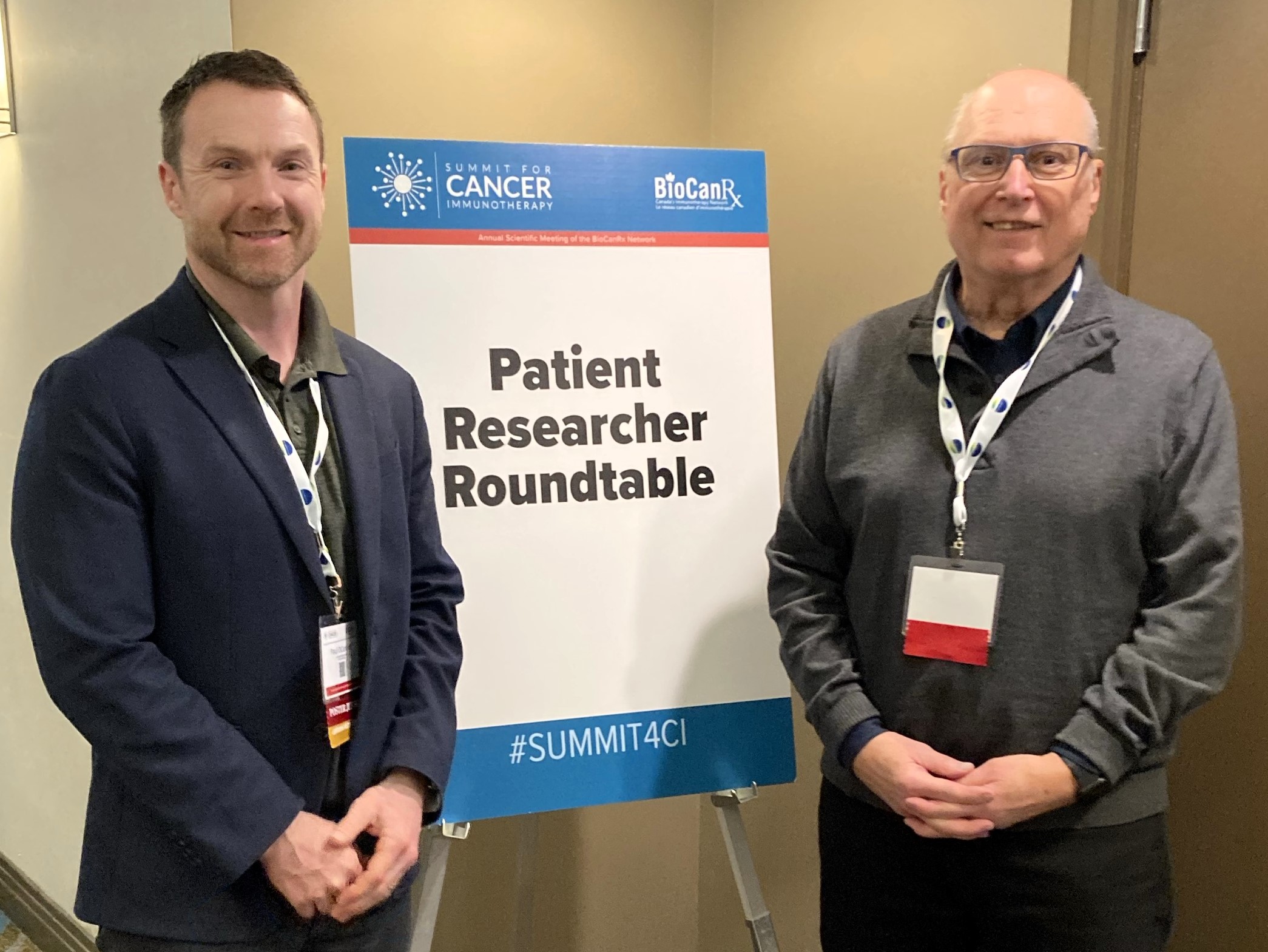Blood cancer community represented at Summit for Cancer Immunotherapy
Members of the LLSC blood cancer community participated in the Summit for Cancer Immunotherapy 2025 in Toronto this month. The annual event is led by BioCanRx, Canada’s Immunotherapy Network.
Nadine Frisk is a community partner in LLSC's research grant review process, and a member of the working group of the Learning Institute, which brings together leaders from oncology patient communities and academics from the immunotherapy research community.
“Attending the BioCanRX Learning Institute equips me with invaluable skills and knowledge to strengthen my role as a Patient Advocate. My passion for immunotherapy drives my mission to support the development of cutting-edge therapies that can transform the blood cancer journey for others. A heartfelt thank you to BioCanRx for creating the opportunity to come together, share insights, and learn from one another," says Nadine.
 Another of LLSC's community partners, Terry Hawrysh (shown here with LLSC Research Program Director Paul O'Connell), helped facilitate the patient-researcher roundtable at the Summit. Terry is a member of LLSC's Medical & Scientific Advisory Committee, as a Community Partner Representative.
Another of LLSC's community partners, Terry Hawrysh (shown here with LLSC Research Program Director Paul O'Connell), helped facilitate the patient-researcher roundtable at the Summit. Terry is a member of LLSC's Medical & Scientific Advisory Committee, as a Community Partner Representative.
Nadine adds, "Every moment spent with The Leukemia & Lymphoma Society of Canada (LLSC) community feels like coming home—a place where connection, purpose, and a collective commitment to making a difference come to life. I look forward to collaborating with Paul and Terry in the future.”
Paul O'Connell gives this report fresh upon his return:
I spent the last couple of days at the Summit for Immunotherapy in Toronto to hear about the latest progress in cancer immunotherapy from scientific, clinical, industry and patient perspectives, through internationally recognized speakers, scientific presentations, and poster sessions.
This year included the following sessions:
- Clinical Testing of Innovative T Cell Therapies for Cancer
- Nobody Say T cells - Leveraging Other Types of Immune Cells to Fight Cancer
- Fueling the Fight - Modulating Immune Metabolism in Cancer
- Using New Technologies to Map Tumours
- mRNA-based Innovation in Cancer Immunotherapy
Keynote speakers on CAR-NK cell therapy and cancer vaccines
These sessions were sandwiched between two amazing keynote speakers. Dr. Katy Rezvani from MD Anderson Cancer Centre in Texas opened the conference discussing her work on developing CAR NT-cell therapy, an innovative approach to immunology to fight a variety of cancers, including blood cancers. NK, or natural killer, cells are a type of white blood cell, part of the innate immune system, that can kill infected and diseased cells, like cancer cells.
CAR-NK cell therapy, compared to CAR T-cell therapy, offers potential advantages like a broader range of target cells and less risk of side effects, making them a promising alternative for certain cancers.
To close the Summit, Dr. Uğur Şahin, the founder and CEO of BioNTech (COVID vaccine!) gave a very interesting talk about his work on cancer vaccines. Unlike flu vaccines which are given to prevent the flu, these vaccines would be given after cancer diagnosis to boost the immune system in the fight against cancer. These personalized mRNA cancer vaccines would target specific mutations in a patient's tumor, aiming to harness the body's immune system to fight cancer.
Personal lessons from the Learning Institute
Aside from all the great science, I have the honour of being the Co-Chair of the Learning Institute at this conference. The Learning Institute. Participants take part in webinars in the lead-up to the conference to gain a better understanding of cancer biology and immunotherapy. They attend plenaries and engage in knowledge exchange activities and a Patient-Researcher Roundtable event. and other knowledge exchange activities.
The overall goal of the Learning Institute is ensure that novel cancer immunotherapy is accessible to the cancer patient community, including the LLSC blood cancer community, and that the patient voice is heard at every step of the research process. "Patient scholars" are defined as anyone who has lived experience with cancer (as a patient, caregiver or support person) and has interest in becoming involved in using the patient perspective for the betterment of research.
Being part of the Learning Institute is a humbling experience. It is easy to sit and admire the science being presented but it is another thing entirely to speak with people who have been impacted directly cancer and see the impact that this work has had/could have had/may have on their lives.
There is still a long way to go and the patient voice needs to be a bigger part of the research process but the future of cancer immunotherapy holds a lot of promise.
On top of all this work, this conference was a great opportunity to talk to many friends of LLSC including Nadine Frisk and Terry Hawrysh. I first met Nadine at the 2023 Summit for Cancer Immunotherapy; she has been engaged with LLSC ever since as a volunteer Blood Cancer Ambassador and a Community Partner Reviewer for our grants. She is a passionate advocate for those affected by blood cancer; she just keeps saying yes to everything we throw at her!
Terry has been a friend of LLSC for many years, and and has been instrumental in helping to develop guidelines for patient engagement in research for many national organizations, including LLSC. A principal aim of cancer research is to improve the lives of those affected by the disease. Thus, their voices must be heard. Without them, the picture remains incomplete.
As always, the BioCanRx Summit for Cancer Immunotherapy was a wonderful experience that gets my mind spinning about the possibilities for blood cancer research in Canada!
